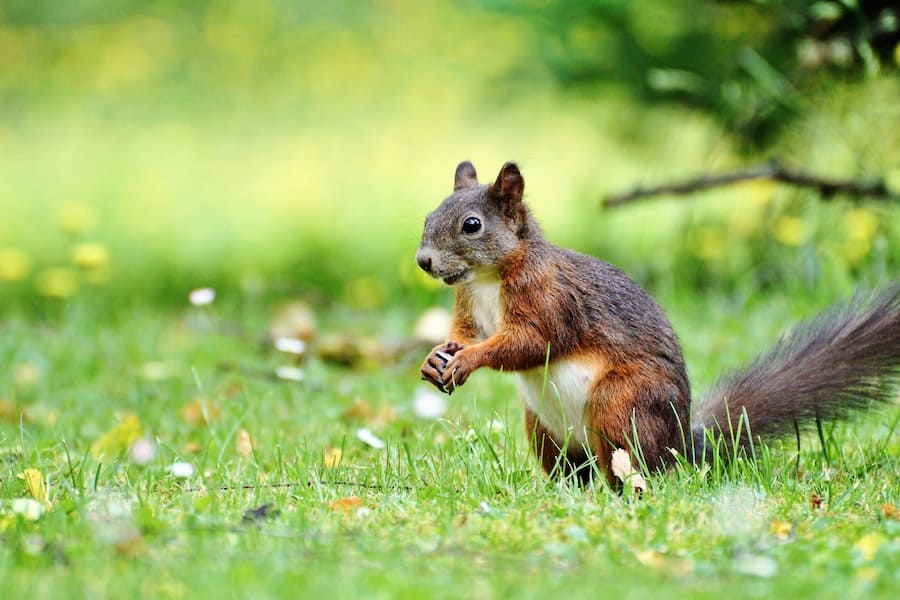Bird feeders provide a delightful opportunity to attract and observe a variety of avian visitors in our gardens. However, the persistent presence of squirrels can quickly turn this idyllic scene into a battle for birdseed. These agile creatures are masters of infiltration, constantly seeking ways to access the enticing food sources meant for our feathered friends. In our quest to keep squirrels at bay, exploring the power of scents becomes an intriguing solution. By harnessing the repellent properties of certain smells, we can create an environment that deters squirrels from raiding our bird feeders. In this article, we delve into the world of scents, discovering which aromas can effectively keep squirrels away and provide a harmonious haven for our beloved birds.
What smells keep squirrels away from bird feeders?
Several scents can help keep squirrels away from bird feeders. Peppermint is known to have a strong aroma that squirrels find unpleasant, so using peppermint oil or planting peppermint plants near your bird feeder can be effective. Another option is cayenne pepper, which irritates squirrels’ senses and is a natural deterrent. Sprinkling cayenne pepper around the feeder or creating a cayenne pepper spray can discourage squirrel visits. Additionally, the pungent smell of garlic can repel squirrels. Using garlic cloves or garlic powder near the feeder can help keep them at bay. Remember to refresh these scents periodically to maintain their effectiveness.
The Popularity Of Bird Feeders
Bird feeders have gained tremendous popularity among nature enthusiasts and bird lovers alike. These simple structures, often filled with seeds, nectar, or suet, provide a convenient food source for various avian species. Bird feeders offer several benefits, including:
Bird Watching: Bird feeders attract a diverse array of bird species, allowing enthusiasts to observe and appreciate the beauty of different birds up close. They provide a unique opportunity to witness their behavior, feeding habits, and interactions with other birds.
Conservation Efforts: By providing a reliable food source, bird feeders play a role in supporting bird populations, particularly during times when natural food supplies may be scarce. This can help sustain birds throughout the year, especially during harsh weather conditions and migration periods.
Educational Tool: Bird feeders provide a valuable educational tool for adults and children. They offer an accessible and engaging way to learn about bird species, their feeding preferences, and their natural habitats. Bird watching can foster a deeper understanding and appreciation for the avian world.
Wildlife Photography: Bird feeders serve as enticing settings for capturing stunning photographs of birds in action. Photographers can showcase the vibrant colors, intricate details, and unique behaviors of these feathered creatures.
Therapeutic Benefits: Observing birds at feeders has been shown to have therapeutic effects, promoting relaxation, stress reduction, and a sense of connection with nature. Bird watching can serve as a calming and enjoyable activity, providing a welcome break from the demands of daily life.
Community Engagement: Bird feeders often serve as gathering spots for bird enthusiasts, creating opportunities for shared experiences and conversations and exchanging knowledge and tips among individuals with a common interest.
The Common Problem With Squirrel Bird Feeders
Squirrels have voracious appetites and can quickly deplete the birdseed in feeders, leaving little for the intended avian visitors. This not only results in an increased frequency of refilling the feeder but also adds to the cost of maintaining a consistent food supply for birds.
Squirrels are adept at gnawing and chewing through various types of bird feeders, especially those made of plastic or wood. Their sharp teeth and agile movements can cause structural damage, leading to feeder malfunctions or even destruction. This requires frequent repairs or replacement of feeders, adding to the overall expenses.
Squirrels’ energetic and acrobatic antics around bird feeders can scare away smaller birds, disrupting their feeding patterns and causing them to seek alternative food sources. This interference can deter the very birds that the feeders were intended to attract, reducing the enjoyment of bird watching.
Squirrels rummage through bird feeders, leaving debris and droppings and potentially introducing contaminants. This can compromise the hygiene of the feeder, leading to the spread of diseases among visiting birds. Regular cleaning and maintenance become necessary to mitigate these risks.
In some cases, squirrels may establish dominance over bird feeders, monopolizing the food source and preventing birds from accessing it. Their territorial behavior can discourage birds from frequenting the feeder, causing frustration for bird enthusiasts who wish to attract a diverse range of avian visitors.
How To Keep Squirrels Away From Bird Feeders?
Keeping squirrels away from bird feeders can be a challenging task, but there are several effective strategies you can employ to deter them. Here are some proven methods to keep squirrels at bay:
Squirrel-Proof Feeders:
Invest in squirrel-proof bird feeders designed with features that make it difficult for squirrels to access food. These feeders often employ weight-activated perches or adjustable baffles that close off access when a squirrel’s weight is detected.
Strategic Placement:
Position your bird feeders in locations that are less accessible to squirrels. Hang them at least 10-12 feet away from trees, fences, and other structures, ensuring no nearby launch points for squirrels to jump onto the feeders.
Baffle Installation:
Install squirrel baffles or guards above or below your bird feeders. These physical barriers can be cone-shaped or cylindrical and work by preventing squirrels from climbing or jumping onto the feeder. Make sure the baffles are positioned far enough away from any potential launching points.
Squirrel-Resistant Food:
Opt for birdseed mixes that are less appealing to squirrels. Avoid using sunflower seeds, peanuts, and corn, as these are often the preferred food sources for squirrels. Instead, choose seeds like safflower or nyjer (thistle) that are less enticing to them.
Hot Pepper Or Repellent Sprays:
Create homemade sprays by mixing hot pepper or chili powder with water and spraying it on birdseed or around the bird feeder. Squirrels dislike the strong scent and taste, deterring them from approaching. Ensure the spray does not directly touch the birdseed to avoid harming birds.
Scare Tactics:
Employ visual and auditory deterrents to startle and scare away squirrels. Hang reflective objects like CDs or wind chimes near the feeder, or use motion-activated devices that emit sounds or flashes of light when squirrels approach.
Natural Barriers:
Surround the base of your bird feeder with substances that repel squirrels, such as rough gravel or wood chips. These textures can make it uncomfortable for squirrels to approach the feeder.
Regular Maintenance:
Keep the area around the feeder clean and free of spilled seeds or debris that might attract squirrels. Regularly check and refill the feeder to ensure a consistent bird food source.
Additional Tips And Considerations
In addition to the strategies mentioned, here are some additional tips and considerations to help keep squirrels away from bird feeders:
- Apply a layer of petroleum jelly or cooking oil to the pole supporting the bird feeder. This makes it slippery and difficult for squirrels to climb up.
- Ensure that the suspension method for your bird feeder is secure and squirrel-resistant. Squirrels can be pretty crafty, so use strong hooks, wires, or chains that can withstand their weight and prevent them from tampering with the feeder.
- Place squirrel-specific feeders or feeding stations away from your bird feeders. Fill these dedicated squirrel feeders with seeds, nuts, or corn to redirect their attention and keep them occupied, reducing their interest in the bird feeders.
- Opt for bird feeders made of metal instead of plastic or wood. Squirrels find metal feeders more difficult to gnaw through, reducing the chances of damage or feeder destruction.
- Install Electric Fencing: For persistent squirrel problems, consider installing an electric fence around the area where the bird feeder is located. The mild electric shocks act as a deterrent, preventing squirrels from accessing the feeders.
Final Thoughts
In conclusion, keeping squirrels away from bird feeders requires a combination of strategies, patience, and persistence. By implementing squirrel-proof feeders, strategic placement, deterrent sprays, and other methods, you can create an environment that discourages squirrel intrusion and allows birds to enjoy their meals undisturbed. It’s important to remember that squirrels are intelligent and adaptable creatures, so you may need to modify and reinforce your deterrent measures continuously. Regular maintenance, such as cleaning the feeder and replenishing the food, is essential to attract birds and prevent squirrels from being drawn to spilled seeds.
FAQ’s
Q: Are there any scents that repel squirrels from bird feeders?
A: Yes, some scents can help repel squirrels from bird feeders. Peppermint, cayenne pepper, garlic, and predator urine have deterrent effects on squirrels. These scents can be used in various forms, such as oils, sprays, or natural substances to create a barrier around the feeder.
Q: How do squirrel-proof bird feeders work?
A: Squirrel-proof bird feeders are designed with mechanisms that make it difficult for squirrels to access food. They often have weight-activated perches or adjustable baffles that close off access when a squirrel’s weight is detected. These features prevent squirrels from reaching the birdseed while allowing birds to feed undisturbed.
Q: Are there any DIY solutions to keep squirrels away from bird feeders?
A: Yes, there are several DIY solutions you can try. For example, you can create homemade sprays using hot pepper or chili powder mixed with water to deter squirrels. Other options include using physical barriers like cones or baffles, greasing the feeder pole, or incorporating scented substances around the feeder area.








